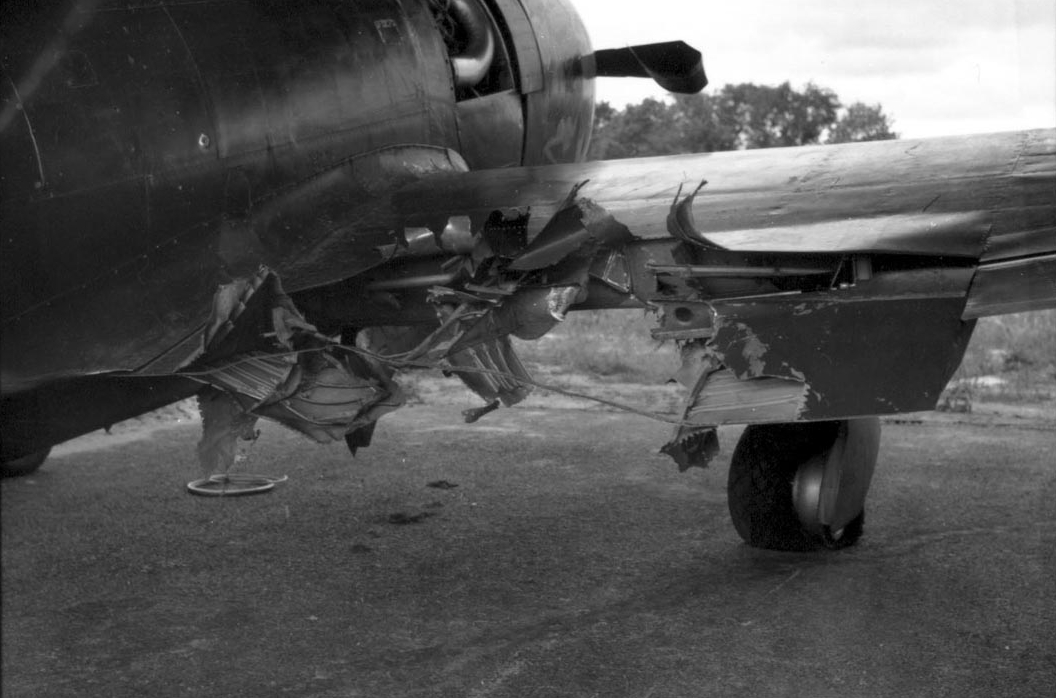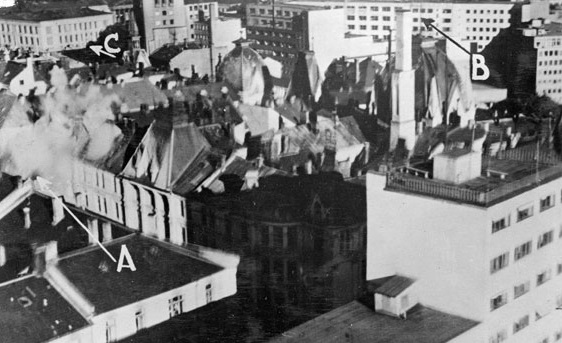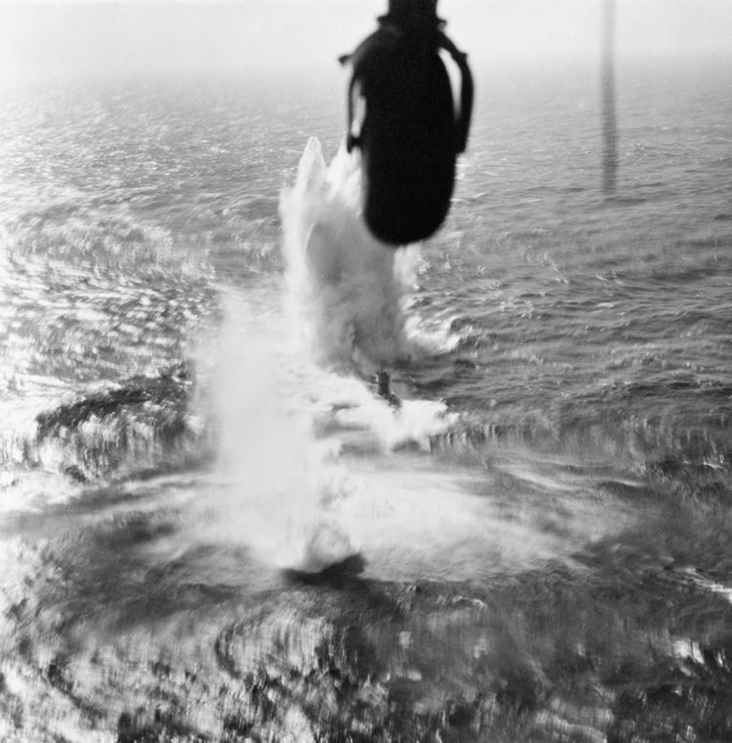The War in the Air
By Capt. Norman Macmillan, M.C., A.F.C.
The War Illustrated, Volume 7, No. 159, Page 118, July 23, 1943.
After the conquest of North Africa and the capture of the Italian islands of Pantelleria, Lampedusa and Lampione in the Sicilian Narrows, a strange hush descended upon military operations over all Europe. While the armies waited, and doubtless while new dispositions were being made, the war in the air continued with undiminished fury and indeed, in some areas of operation, with increasing power.
Intensive attacks were made upon the Italian peninsula from Leghorn southwards; upon the islands of Sicily and Sardinia. The smashing blows of Bomber Command upon the industrial towns of Ruhr and Rhine descended with shorter pauses between each raid. Repeatedly, day after day, the broadcast news bulletins stated that the principal news of the war was in the air. There could be no better illustration of the cardinal principle of war in the air, which is this: war in the air cannot pause, it is ever on the offensive, and must continue on the offensive or fail.
The men who fly never let up. From the night following May 11, 1940, Bomber Command has never ceased to maintain its offensive against Germany and occupied Europe. It may have had to miss a night now and again on account of weather. But that is all. The battle waged by Bomber Command is continuous, and will continue without cessation until the war ends. The work of this Command may prove to be, ultimately, when the whole history of this long and widespread air war can be calmly assessed, the classic example of the employment of air power.
By keying the Luftwaffe to the tactical assault needs of the German Army, the German High Command made one of its fundamental errors in this war. By doing so it failed to provide a Strategic Air Force. The Luftwaffe as a whole was a tactical force; when strategic operations in the air were demanded, part of the tactical had to be detached for this employment, thereby weakening the parent body. Nor can it be claimed that the equipment of a tactical air force is necessarily the same as that of a strategic air force: on some occasions it may be the same, but on others it must be very greatly different.
It does not appear that anything that Germany can now do can correct the great and basic mistake that the German generals of the Army and Luftwaffe both made. The German troops that were halted by the snows and soldiers of Russia and by the seas and fighter pilots of Britain discovered that the way for further advances could not be prepared for them by a tactical air force.
When the German armies’ advances were brought to a standstill, the paramount need of the German High Command was for a strategic air force which would prepare the way for a further advance. There was no such force. They had not foreseen the demand and for that reason could not be met.
Now the United Nations’ armies have come to a temporary halt – faced, as the German armies were faced, by a sea crossing (and in Russia by a vast plain whose characteristics presented problems as great and grave as those presented by the sea). And, in the similar circumstances which they have to face, the United Nations are possessed of a powerful Allied strategic air force whose blows grow mightier with each passing month, preparing the way for the next onward move of the surface forces, so that, in effect, the grand offensive role never ceases by day or by night.
While this air pressure continues from Britain, from North Africa, from Malta, from aircraft carriers, from Russia, beating like gusts upon the long, indented line of the German-Italian military perimeter, the situation in relation to Japan becomes increasingly important.
In Burma the wild violence of the monsoon breaks in fierce storms that flood the rivers, churns the soil to mud, beat the waters of the Bay of Bengal to angry violence. I have seen it and flown through it and I know how hard a natural enemy to airman the monsoon is. So, in the theatre of the eastern gateway to India, the season spells stalemate upon the ground. But it does not mean the end of air attack.
There is greater risk and strain upon the air crews, greater hardship upon the ground crews, discomfort in the tossing flight of aircraft passing through the turbulent air; but these things are all swept aside by military necessity, and the air war goes on while the front line troops maintain their uncomfortable positions and are stuck by mud.
In the Far East a new offensive has begun, initiated by General MacArthur. It is an offensive designed apparently with the main object of securing more air bases throughout the chains of islands that lie scattered upon the tropic seas between Australia, China and Japan. In those vast seas any advance to re-conquest demands imperatively the possession of full air cover.
For by possession of that air cover transport aircraft can operate to carry supplies to the forward troops, to provide them with arms and ammunition, food, water, medical supplies, hospitals, Red Cross tender aircraft. Without superior air power re-conquest of the lost lands of the Far East might become interminable. But when we have, as we now have in steadily growing measure, air superiority over the Japanese, the ability of the yellow race to maintain its hold upon the lands it has overrun diminishes with every fresh blow that United Nations' air power strikes. Each forward move of the ground forces in concert with the unified plan of air, sea and land operations brings into the realm of the United Nations territory wherein new air bases can be sited, and wrests bases for their air forces from the Japanese.
At the moment, this process has taken its first forward movement, and during this period is fraught with many difficulties; but as the process continues the power of the United Nations will steadily expand, while that of the Japanese will continually contract for, as the Japanese are forced northward, a zone will be reached wherein the islands available to them are smaller, the air bases fewer, the capacity for defence slighter, and the geographical opportunities for the United Nations to engage them become more suited to the application of our strategic air power.
But it is not strange that the offensive against the Japanese in the South West Pacific began during the lull over the German-Italian zone and the monsoon stalemate on the Indo-Burmese front. German and Italy would naturally hope that the Japanese pressure in the Far East might draw away from them some of the terrible air pressure which they now face. General MacArthur’s offensive in the Pacific anticipates the possibility of Japanese intervention there to succour the Axis partners in their European imbroglio.
 U.S. Thunderbolt, piloted by 2nd Lt. Foster, was recently singled out for attack over France by German fighters. Five 20-mm. shells ploughed into the right wing of the aircraft. Its pilot managed to fly the damaged plane to England and crash-land. Photo, U.S. Official.
U.S. Thunderbolt, piloted by 2nd Lt. Foster, was recently singled out for attack over France by German fighters. Five 20-mm. shells ploughed into the right wing of the aircraft. Its pilot managed to fly the damaged plane to England and crash-land. Photo, U.S. Official.
Historical context, by the webmaster
Photo: UPL 20708, American Air Museum.
Previous and next article from The War in the Air
The War in the Air
The strategic and tactical employment of air forces for the prosecution of war on land has at present reached a stage of stabilization; although their methods may differ slightly the aim of the use of
The War in the Air
Perhaps the most important aspect of the rising air offensive of the United Nations against the European end of the Axis is the increasing scale of daylight bombing. For this we have to thank princi
Index
Previous article
Thirteen was a Lucky Number for this Halifax!
R.A.F. Coastal Command Halifax deals with a U-boat in the Bay of Biscay. Heading for the Atlantic when she was spotted, the enemy submarine was destroyed within three minutes. This was the 13th U-bo
Next article
I Was There! - I Was One of the Nine Who Came Back
The closing scene in the glorious stand of the 155th Field Battery R.A. on Feb. 26, 1943, in Tunisia, was briefly described in page 77 of THE WAR ILLUSTRATED by one of the nine survivors who got back





